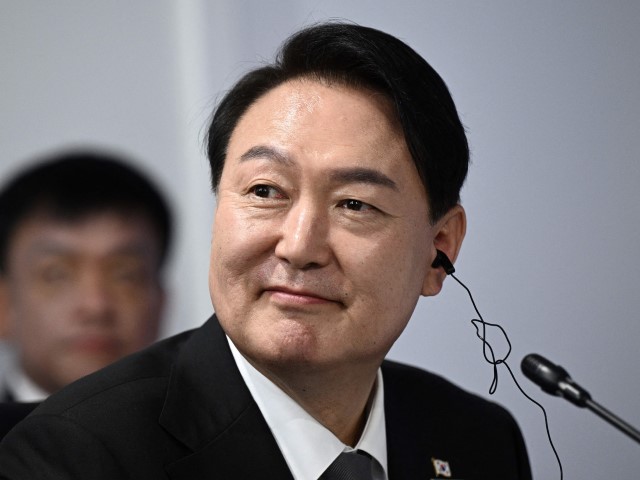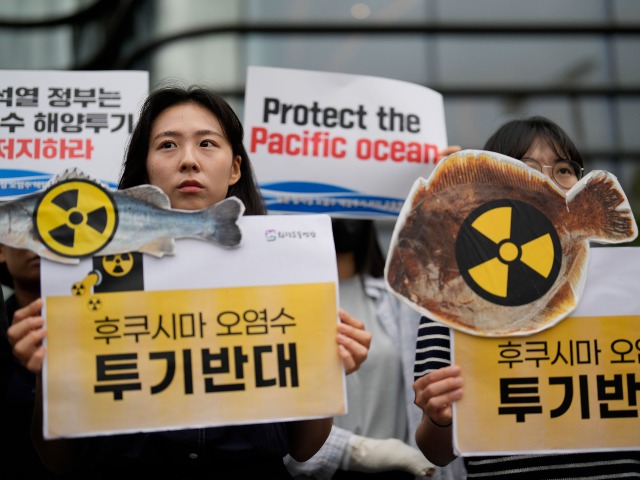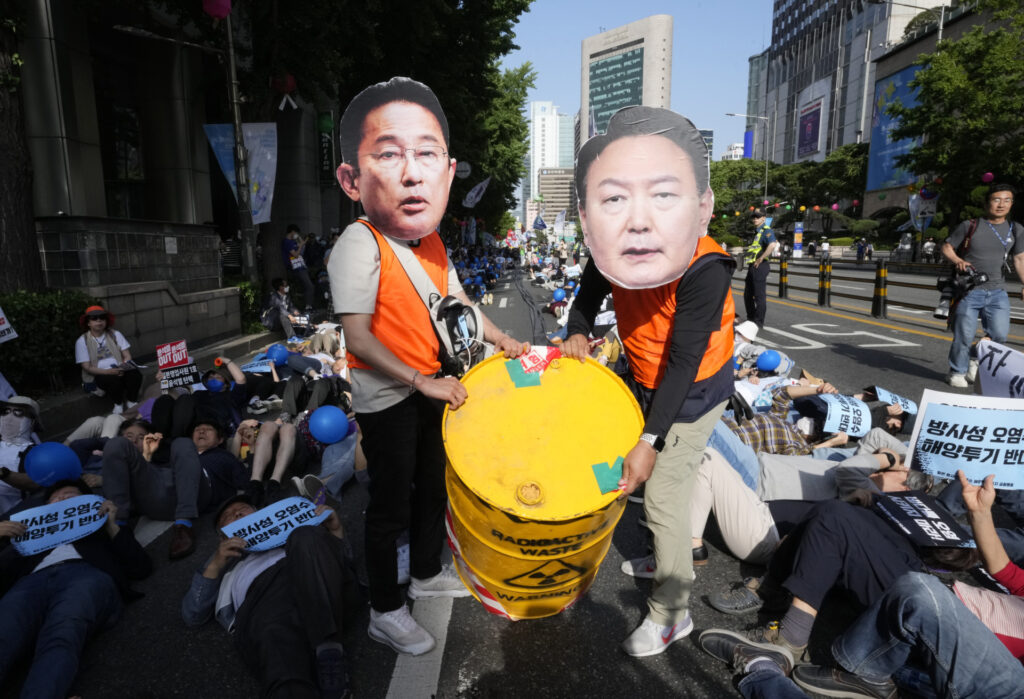China’s state-run Global Times struggled to contain its editorial blood pressure on Sunday as it reported the leaders of South Korea and Japan will attend this week’s NATO summit in Vilnius, Lithuania, for the second year in a row.
“Such a short-sighted move will surely trigger China’s strong opposition and result in regional countries’ heightened vigilance!” the Global Times shrieked.
Actually, most regional countries are busy heightening their vigilance against China, which keeps insisting the entire South China Sea is its property, no matter how many international courts rule against it.
As the Global Times itself pointed out, Seoul and Tokyo sent representatives to last year’s NATO summit in Madrid and nothing earthshaking happened. While international analysts speculated the South Koreans and Japanese are looking for new friends as American power declines under President Joe Biden, the Chinese fumed that NATO is just a puppet of the United States and could be ordered at any moment to begin eyeing China as its chief threat instead of Moscow.
China’s rhetoric has not changed much over the past year.

South Korea’s President Yoon Suk-Yeol looks on during a tri-lateral meeting with the U.S. President and Japan’s Prime Minister on the sidelines of the NATO summit at the Ifema congress centre in Madrid, on June 29, 2022. (BRENDAN SMIALOWSKI/AFP via Getty Images)
“Chinese experts believe NATO’s intention to extend its tentacles into Asia Pacific region not only exposes the selfish purpose of the US, which plays a central role in the alliance, to impose its own hegemonic intention over other NATO members’ interests, but will further divide the group as in Europe, France may not stand alone in its opposition,” the Global Times seethed.
What really enrages China is the plan for NATO to open a liaison office in Japan so it can coordinate efforts to “contain” China with allies like South Korea, Australia, and New Zealand.
As hinted above, France opposes opening a NATO office in Japan. Nikkei Asia explained on Monday that France is afraid of China’s economic leverage and would prefer not to dilute its own influence in NATO by expanding the alliance.
As NATO is already preoccupied with matters such as the Russian war in Ukraine and Sweden’s application to join the alliance, the matter of opening a liaison office in Japan was already considered “lower priority,” and French opposition might have already tabled the proposal until next year, although some other NATO members reportedly believe extending the alliance’s presence in Asia is strategically “essential.”
The Global Times poured all of its animosity toward the United States into a primal scream that could not have been louder if NATO was contemplating an outpost in Beijing:
Pushing NATO to extend its role into Asia Pacific not only exposes the US’ selfishness of imposing its own hegemonic goals over other members’ national security, it will also risk dividing the alliance, as some NATO members may be reluctant to follow suit, Song Zhongping, a Chinese military expert and TV commentator, told the Global Times.
It would be a “very hostile move” to open a liaison office in Japan, Chinese experts said. The discussion comes at a time when the US is seeking to keep high-level communication lines open with China as US Treasury Secretary Janet Yellen just concluded her visit to China, who noted that the US does not seek to “decouple” from China.
At the same time that US politicians are uttering sweet words to assure China that US is not to seek decoupling from Beijing, on the other hand, it is sparing no effort to marshal its allies to counter China in the region. These self-contradictory moves are deeply disturbing, Li said. He noted that these actions reveal a lack of sincerity and credibility by Washington to fix China-US relations.
The Global Times dismissed South Korea and Japan as mere “vassals” of the evil United States, with South Korea especially helpless to resist any commands from Washington. The Chinese Communist paper spiced up its complaint with military threats about the folly of Seoul and Tokyo choosing to put their puny armies on the “front line of China’s countermeasures” if a fight breaks out between China and the United States.
South Korean and Japanese leaders are planning to meet on the sidelines in Vilnius, but not to plot some shady trilateral alliance against poor, picked-on China. They are mostly meeting so Japanese Prime Minister Kishida Fumio can persuade South Korean President Yoon Suk-yeol to accept Japan’s plan to discharge wastewater from the Fukushima nuclear disaster of 2011 into the Pacific Ocean.

Members of civic groups hold signs during a rally to oppose the Japanese government’s decision to release treated radioactive water from the Fukushima nuclear power plant, near a building that houses the Japanese Embassy, in Seoul, South Korea, Thursday, June 8, 2023. (AP Photo/Lee Jin-man)
The Fukushima plan is proving to be a very tough sell in South Korea, even with the blessing of the International Atomic Energy Agency (IAEA). Yoon is planning a statement about Fukushima on Friday when he will conclude a three-day trip to Poland following the NATO summit.
Yoon is also facing increased pressure for South Korea to supply arms to Ukraine and he wants more international support against the latest round of North Korean belligerence.
“Now is the time to clearly demonstrate that the international community’s determination to deter North Korea’s nuclear weapons program is stronger than North Korea’s desire to develop nuclear weapons,” Yoon said on Sunday as he prepared to depart for Vilnius.
As for Japan, Kishida is strongly focused on promoting the Fukushima wastewater release plan to everyone else that has Pacific beachfront property. He also hopes to hold a bilateral meeting with Ukrainian President Volodymyr Zelensky on Wednesday to discuss Japanese involvement in rebuilding postwar Ukraine. One of Kishida’s big selling points is Japan’s phenomenal success at rebuilding its northeastern region after the 2011 earthquake and tsunami that caused the Fukushima nuclear disaster.

Protesters wearing masks of Japanese Prime Minister Fumio Kishida, left, and South Korean President Yoon Suk Yeol perform during a rally against Japanese government’s decision to release treated radioactive water from Fukushima nuclear power plant, in Seoul, South Korea, Saturday, May 20, 2023. (AP Photo/Ahn Young-joon)
NATO has good reasons for developing stronger ties with Asian democracies. In addition to letting the emerging Chinese-Russian axis of tyranny know that it cannot take the Indo-Pacific for granted as a power base, NATO planners understand that threats like cyber-warfare are independent of geography, and commercial concerns such as chip manufacturing and supply chains have direct military ramifications.
In sum, if Chinese state media is hyperventilating about the 2023 NATO summit in Vilnius, then the seeds of Indo-Pacific cooperation planted at the 2022 summit in Madrid might be taking root. Strategic planners can take some comfort from seeing Beijing look so uncomfortable, especially as China’s continued refusal to denounce Russia’s invasion of Ukraine hampers its ambitions to become a global diplomatic super-power. It will be encouraging if the Vilnius summit turns out to be as exciting as the Global Times made it sound.





Comments are closed.